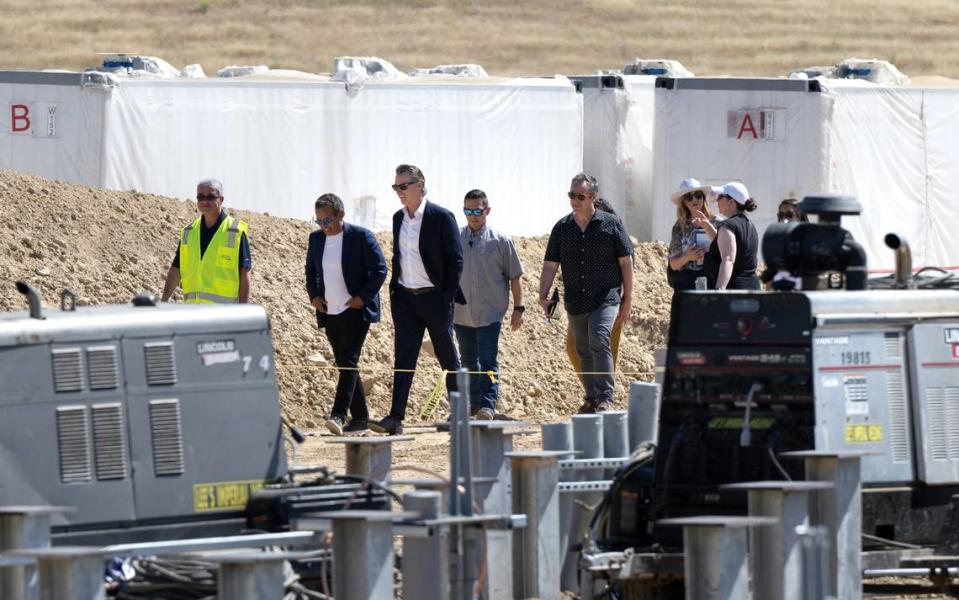How will California’s budget deal help speed up $180B worth of infrastructure projects?
- Oops!Something went wrong.Please try again later.
Gov. Gavin Newsom is poised to sign a package of five bills in the coming days that he says will make it easier to build $180 billion worth of clean energy, water, transportation and broadband internet projects across California over the next decade.
But what projects would benefit and how quickly they could be completed remains to be seen.
The governor fought hard for his infrastructure plan, taking deliberations over the state’s $310 billion 2023-24 budget down to the wire last month. He threatened to veto the legislature’s budget priorities if they failed to approve his proposals. In the end, he agreed to drop a provision that could have fast-tracked the Delta Conveyance project, a 45-mile tunnel that would pull water from the Sacramento River and pipe it underneath the Sacramento-San Joaquin Delta.
The Senate is expected to pass the bills on Wednesday, following overwhelming approval in the Assembly. They will take effect as soon as Newsom signs them.
One bill is designed to expedite certain water, energy and transportation projects by limiting legal challenges based on the California Environmental Quality Act, or CEQA, to nine months. Another cuts red tape by authorizing the Department of Fish and Wildlife to issue permits allowing species designated as “fully protected” to be harmed during the construction of specified projects that meet various mitigation requirements.
Other provisions empower the California Department of Water Resources to streamline procurement and make it easier for the Department of Transportation to offset the environmental impacts of its future projects.
The Newsom Administration declined to name specific projects that are expected to benefit from the new legislation. But Sites Reservoir — a $4 billion water storage facility to capture storm water from the Sacramento River — is expected to be a top priority. Mark Tollefson, undersecretary for the State Transportation Agency, said construction of suicide barriers on the Coronado Bridge in San Diego could also be expedited.
“Every single one of these provisions — depending on the type of project — we did to reduce time, reduce money,” said Gayle Miller, chief deputy of policy at the California Department of Finance.

Will California’s infrastructure plan really speed up projects?
The Newsom Administration calls the bills California’s “most ambitious permitting and project review reforms in a half-century” and claimed that they would slash the timeline for major infrastructure builds by up to a third.
Others are more skeptical of the significance the legislation will have.
One telling wrinkle can be found in the bill calling for expedited judicial review of lawsuits filed under CEQA. It requires that a judge rule within 270 days — “to the extent feasible.”
The bill mirrors a 2011 law that allowed certain projects certified by the governor, including Sacramento’s Golden 1 Center and San Francisco’s Chase Center, to go through a similar accelerated CEQA review. Although the timelines for the applicable projects were cut from 3-5 years to 1-2 years, none were reviewed within 270 days, according to a state Senate analysis of 18 projects completed between 2011-2018.
“The ‘if feasible’ part is really the loophole that swallows up the rule,” said David Pettit, a senior attorney at the Natural Resources Defense Council. “The legal process will take what it’s going to take and there’s nothing in the trailer bill that forces a judge to go more quickly.”
Nancy Rader, executive director of the California Wind Energy Association, said she anticipates the package of bills will have a “marginal impact” on wind projects in California.
“There are a lot of other ways that we could expedite transmission and renewable energy projects that would have a much more tangible impact but aren’t included in this package,” Rader said. In particular, she said, the state should revamp drawn-out and duplicative reviews by the California Public Utilities Commission that can add up to three years to the approval of a transmission project.
Peter Tateishi, CEO of the Associated General Contractors of California, wouldn’t put a figure on it but said he believes the package will help projects move more efficiently through permitting — the phase where contractors usually face the longest delays.
“We think it’s going to be better than doing nothing,” Tateishi said. “The bill does have some ambiguous terminology for the courts. However, on the examples that have been previewed, it has effectively sped up the timelines getting to construction.”
Tateishi specifically pointed to Sacramento’s Golden 1 Center, which was reviewed by a judge in just under a year.

